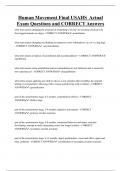Human Movement Final USAHS Actual
Exam Questions and CORRECT Answers
what term means changing the elements of something to fit into our existing schemas? (all
four legged animals are dogs) - CORRECT ANSWER✔✔- assimilation
what term means changing our thinking in response to new information? (a cow is a big dog)
- CORRECT ANSWER✔✔- accommodation
what term means a balance of assimilation and accommodation? - CORRECT ANSWER✔✔-
equilibrium
what term means when assimilation and accommodation are not balanced, and is caused by
new experiences? - CORRECT ANSWER✔✔- disequilibrium
what terms means applying one skill or idea to a new situation that resembles the original
setting or circumstance? (drawing with a crayon and drawing with a marker) - CORRECT
ANSWER✔✔- generalization
part of the sensorimotor stage, 0-2 months, controlled by reflexes - CORRECT
ANSWER✔✔- Reflex stage
part of the sensorimotor stage, 1-4 months, repetitive movements - CORRECT
ANSWER✔✔- primary circular reactions
part of the sensorimotor stage, 4-8 months, intentional behavior and object concepts
developing- attempt to make interesting events last longer (rattles) - CORRECT
ANSWER✔✔- secondary circular reactions
part of the sensorimotor stage, 8-12 months, object performance, cause and effect, space and
time, imitation - CORRECT ANSWER✔✔- coordination of secondary circular reactions
,part of the sensorimotor stage, 12-18 months, problem solving through trial and error, active
motor experimentation, means and ends are combined - CORRECT ANSWER✔✔- tertiary
circular reactions
part of the sensorimotor stage, 18-24 months, problem solve without experimentation,
manipulate environment, mental representation, handle differed information, consequences of
actions, combining object together, spatial reactions - CORRECT ANSWER✔✔- invention
of new meaning through mental combinations
which stage of cognitive development includes matching and sorting, identification and
labeling, symbolic play, and representational phase? - CORRECT ANSWER✔✔-
preoperational stage (2-7 years)
which stage of cognitive development includes reversibility, seriation, classification,
conservation, transformation, moral development, and symbolic thinking? - CORRECT
ANSWER✔✔- concrete operational stage (7-12 years)
which stage of cognitive development includes highly symbolic thought and representation,
and hypothetico-deductive reasoning? - CORRECT ANSWER✔✔- formal operational stage
(12 years and up)
what term means the product of many integrated processes carried out by the brain allowing
person to be aware, think, learn, judge, and execute behavior? - CORRECT ANSWER✔✔-
cognition
what is described in the framework as having components of judgement, concept formation,
metacognition, executive functions, praxis, cognitive flexibility, and insight, which allows us
to adapt to situations, think abstractly, and plan for the future? - CORRECT ANSWER✔✔-
higher-level cognitive functions
what term means mentally examining options to form an opinion or belief, and utilizes past
experiences and knowledge to understand implications for one's decisions? - CORRECT
ANSWER✔✔- judgement
what is the ability to organize information to develop ideas based on common qualities of
objects or situations, and may involve linking information or sensory experiences to form an
, understanding of something that is not concrete? - CORRECT ANSWER✔✔- concept
formation
what is awareness of one's own cognitive processes and the ability to manipulate and control
one's own cognition? - CORRECT ANSWER✔✔- metacognition and self-awareness
complex goal-directed behavior such as decision making, problem solving, abstract thinking,
and mental flexibility - CORRECT ANSWER✔✔- executive functions
the ability to carry out sequential movements, with correct timing and transitions between
movements - CORRECT ANSWER✔✔- praxis
the ability to change strategies when confronting a problem - CORRECT ANSWER✔✔-
cognitive flexibility
realistic concept of ones own capabilities, important for making safe decisions to correct
errors when they are made - CORRECT ANSWER✔✔- insight
maintaining attention on one activity or stimulus for a long period of time - CORRECT
ANSWER✔✔- sustained attention
focusing on one or more stimuli, while other stimuli within the environment are ignored -
CORRECT ANSWER✔✔- selective attention
focusing on two or more stimuli at the same time - CORRECT ANSWER✔✔- divided
attention
focusing our attention on one task, then the ability to shift our attention to another -
CORRECT ANSWER✔✔- alternating attention (shifting attention)
the ability to retain information while we are working on a task - CORRECT ANSWER✔✔-
working memory




